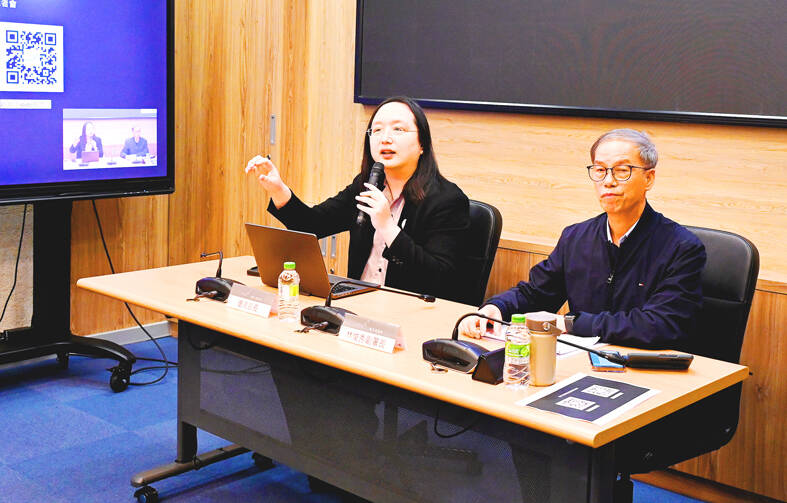The Cabinet on Thursday approved a slew of draft amendments to the Electronic Signatures Act (電子簽章法), specifying the legality of electronic signatures and introducing provisions to pave the way for their international interoperability.
The draft amendments to the act, a law that has been in effect since 2002, but has not undergone any amendments to date, were proposed by the Ministry of Digital Affairs and are to be sent to the Legislative Yuan for review, the Executive Yuan said.
Specifying that electronic signatures and signatures on paper have equal functionality and legality, the draft bill introduces a key provision stating that “electronic documents and electronic signatures shall not be denied solely because of their electronic form,” according to a document submitted to the Cabinet by the ministry.

Photo: Chu Pei-hsiung, Taipei Times
To facilitate mutual recognition of electronic signatures between Taiwan and the international community, the government would also be able to acknowledge the legality of electronic signatures issued by overseas and domestic institutions that comply with international standards, set by organizations such as the EU or the International Organization for Standardization, a ministry statement said.
“In terms of international application, as long as the certification technologies of both parties are interoperable and security conditions are equivalent, Taiwan’s courts can recognize the legality of the electronic documents,” the ministry said, including examples such as Acrobat Sign and DocuSign.
Deputy Minister of Digital Affairs Lee Huai-jen (李懷仁) told a news conference that one of the key points of the amendments is to work toward the integration of certification technologies with other nations.
He said that once certification authorities in foreign nations receive Taiwan’s approval, Taiwanese and foreign entities could use electronic signatures on their official documents.
Digital signatures are more secure than general electronic signatures in terms of effectiveness, strength and security standards, because digital signatures utilize encrypted private keys and are issued by government-approved certification authorities, Lee said.
Digital signatures use algorithms or other methods to process an electronic document into digital data and encrypt the signatory’s private key to create an electronic signature, the draft amendments say.
Minister of Digital Affairs Audrey Tang (唐鳳) said at a news conference at the ministry on Thursday afternoon that she had received support from different political parties regarding the draft amendments and hoped to pass them in this legislative session.
“In terms of the public, in any situation requiring a signature or seal, after the passage of the new [draft amendments to the] Electronic Signatures Act, individuals would be able to use electronic signatures as long as the other party does not object,” Tang said.
The ministry would put procedures in place to ensure digital signatures are verified before accounts associated with them are able to publish investment advertisements on Facebook, Google or Line — the three major online advertising platforms in Taiwan — to reduce investment fraud and fake advertising, she said.

A magnitude 4.9 earthquake struck off Tainan at 11:47am today, the Central Weather Administration (CWA) said. The hypocenter was 32.3km northeast of Tainan City Hall at a depth of 7.3km, CWA data showed. The intensity of the quake, which gauges the actual effect of a seismic event, measured 4 in Tainan and Chiayi County on Taiwan's seven-tier intensity scale, the data showed. The quake had an intensity of 3 in Chiayi City and County, and Yunlin County, while it was measured as 2 in Kaohsiung, Nantou County, Changhua County, Taitung County and offshore Penghu County, the data showed. There were no immediate reports of

Weather conditions across Taiwan are expected to remain stable today, but cloudy to rainy skies are expected from tomorrow onward due to increasing moisture in the atmosphere, according to the Central Weather Administration (CWA). Daytime highs today are expected to hit 25-27°C in western Taiwan and 22-24°C in the eastern counties of Yilan, Hualien, and Taitung, data on the CWA website indicated. After sunset, temperatures could drop to 16-17°C in most parts of Taiwan. For tomorrow, precipitation is likely in northern Taiwan as a cloud system moves in from China. Daytime temperatures are expected to hover around 25°C, the CWA said. Starting Monday, areas

Taiwan has recorded its first fatal case of Coxsackie B5 enterovirus in 10 years after a one-year-old boy from southern Taiwan died from complications early last month, the Centers for Disease Control (CDC) said yesterday. CDC spokesman Lo Yi-chun (羅一鈞) told a news conference that the child initially developed a fever and respiratory symptoms before experiencing seizures and loss of consciousness. The boy was diagnosed with acute encephalitis and admitted to intensive care, but his condition deteriorated rapidly, and he passed away on the sixth day of illness, Lo said. This also marks Taiwan’s third enterovirus-related death this year and the first severe

A Taiwanese software developer has created a generative artificial intelligence (AI) model to help people use AI without exposing sensitive data, project head Huang Chung-hsiao (黃崇校) said yesterday. Huang, a 55-year-old coder leading a US-based team, said that concerns over data privacy and security in popular generative AIs such as ChatGPT and DeepSeek motivated him to develop a personal AI assistant named “Mei.” One of the biggest security flaws with cloud-based algorithms is that users are required to hand over personal information to access the service, giving developers the opportunity to mine user data, he said. For this reason, many government agencies and